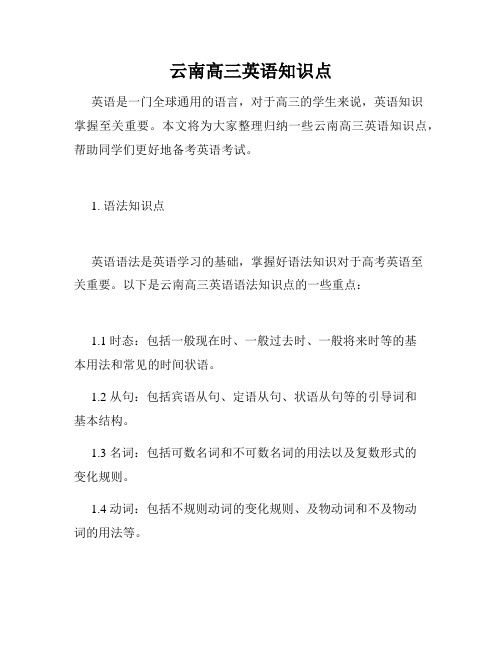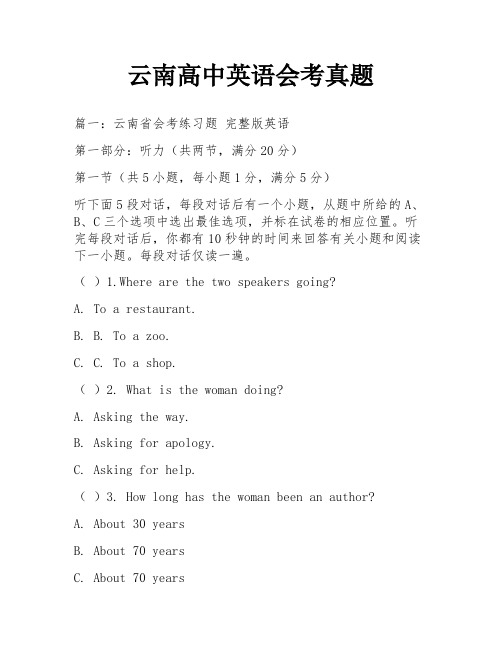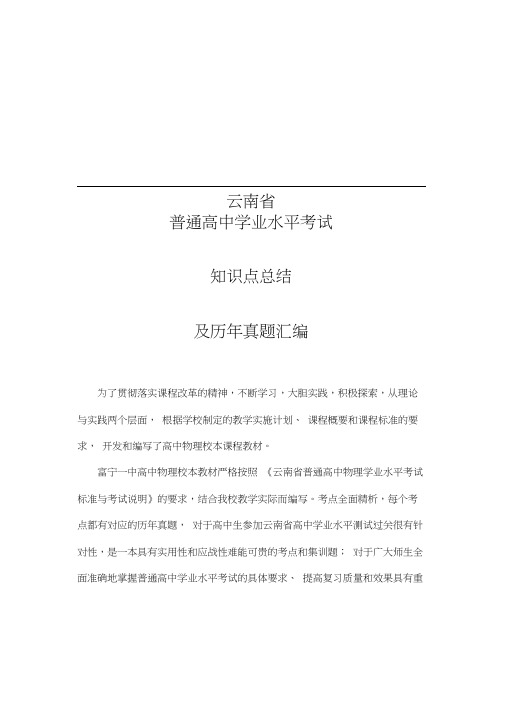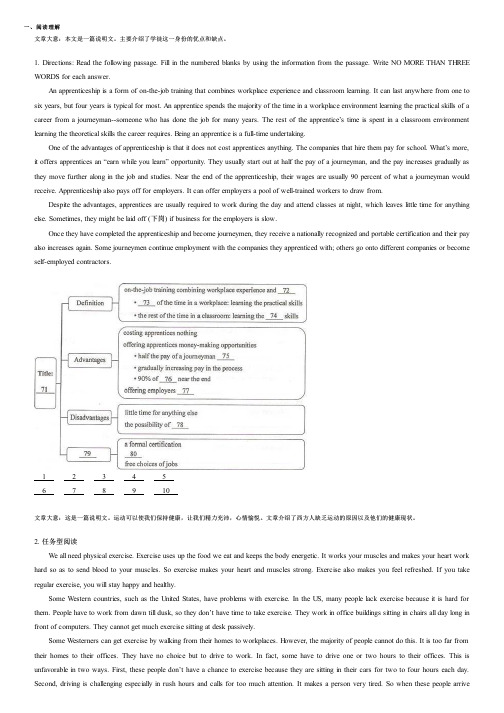云南省高中英语会考近十年高频考点
高中英语阅读理解高频考点专项练习题(历年高频考点真题) (3904) output

一、阅读理解1. 请认真阅读下列短文,并根据所读内容在文章后表格中的空格里填入一个最恰当的单词。
注意:每个空格只填1个单词。
请将答案写在答题卡上相应题号的横线上。
Artificial intelligence (AI) is rushing into business. Firms of all types are using AI to forecast demand, hire workers and deal with customers. The McKinsey Global Institute, a think-tank within a consultancy, forecasts that just applying AI to marketing, sales and supply chains could create economic value of $2.7trn over the next 20 years.Such grand forecasts fuel anxiety as well as hope. Less familiar, but just as important, is how AI will transform the workplace.Start with the benefits.AI ought to improve productivity. Humanyze, a people analytics software provider, combines data from its badges(工牌)with employees’ calendars and e-mails to work out, say, whether office layouts favour teamwork .Slack, a workplace messaging app, helps managers assess how quickly employees accomplish tasks. Companies will see when workers are not just dozing off but also misbehaving.Employees will gain, too. Thanks to advance in computer vision, AI can check that workers are wearing safety equipment and that no one has been harmed on the factory floor. Some will appreciate more feedback on their work and welcome a sense of how to do better.Machines can help ensure that pay rises and promotions go to those who deserve them. That starts with hiring. People often have biases but algorithms(算法), if designed correctly, can be more unprejudiced. Software can flag patterns that people might miss.Y et AI’s benefits will come with many potential drawbacks. Algorithms may not be free of the biases of their programmers, which can have unintended consequences. The length of a travel may predict whether an employee will quit a job, but this focus may harm poorer applicants. Older staff might work more slowly than younger ones and could risk losing their positions if all AI looks for is productivity. And surveillance(监控)may feel Orwellian—a sensitive matter now that people have begun to question how much Facebook and other tech giants know about their private lives.As regulators and employers weigh the pros and cons of AI in the workplace, three principles ought to guide its spread. First, data should be anonymized where possible. Microsoft, for example, has a product that shows individuals how they manage their time in the office, but gives managers information only in aggregated(整合)form. Second, the use of AI ought to be transparent. Employees should be told what technologies are being used in their workplaces and which data are being gathered. As a matter of routine, algorithms used by firms to hire, fire and promote should be tested for bias and unintended consequences. Last, countries should let individuals request their own data, whether they are ex-workers wishing to contest a dismissal or jobseekers hoping to demonstrate their ability to prospective employers.The march of Al into the workplace calls for trade-offs between privacy and performance. A fairer, more productive workforce is a prize worth having, but not if it chains employees. Striking a balance will require thought, a willingness for both employers and employees to adapt and a strong dose of humanity.2. 请认真阅读下列短文,并根据所读内容在文章后表格中的空格里填入一个最恰当的单词。
2025年云南省中考英语人教版一轮复习++专题十+主从复合句+课件

(一……就……)
条件状语 if(如果), unless(除非;如果不), as/so long as 从句 (只要)
续表
从句类型
引导词
原因状语 从句
because(因为),
since(既然),
as(因为;由于)
目的状语 从句
so
that(以便;为了),
in
order
that(为了;以便)
结果状语 so/such...that...(如此……以至于……), so that(因此;所 从句 以)
(2)宾语从句可以转换为“动词+动词不定式”或“特殊疑问词+动词不定式” 结构
I hope that I can go to senior high school.=I hope to go to senior high school.我希望我能上高中。 I didn't know how I could do it.=I didn't know how to do it.我不知道 怎么做这件事。
项目二 语法过关
专题十 主从复合句
语法梳理 考点综合过关
考点1 宾语从句(必考)
考点复习 在句中起宾语作用的从句称为宾语从句。包括动词的宾语从句、介词
的宾语从句和系表结构的宾语从句。宾语从句的连接词有从属连词that, whether, if;连接代词what, who, whom, whose, which等;连接 副词when, where, how, why等。
地点状语 从句 where(在哪里), wherever(无论什么地方)
方式状语 从句 as(按……的方式;像……), as if/though(好像)
续表
云南高三英语知识点

云南高三英语知识点英语是一门全球通用的语言,对于高三的学生来说,英语知识掌握至关重要。
本文将为大家整理归纳一些云南高三英语知识点,帮助同学们更好地备考英语考试。
1. 语法知识点英语语法是英语学习的基础,掌握好语法知识对于高考英语至关重要。
以下是云南高三英语语法知识点的一些重点:1.1 时态:包括一般现在时、一般过去时、一般将来时等的基本用法和常见的时间状语。
1.2 从句:包括宾语从句、定语从句、状语从句等的引导词和基本结构。
1.3 名词:包括可数名词和不可数名词的用法以及复数形式的变化规则。
1.4 动词:包括不规则动词的变化规则、及物动词和不及物动词的用法等。
1.5 形容词和副词:包括形容词和副词的比较级和最高级的构成规则,以及副词修饰动词和形容词的用法。
2. 阅读理解技巧阅读理解是英语考试中的重要部分,掌握好阅读理解的技巧对于高考英语的得分至关重要。
以下是云南高三英语阅读理解技巧的一些要点:2.1 仔细阅读题目要求:在阅读文章之前,先阅读题目要求,了解答题的要求和形式。
2.2 熟悉文章结构:快速浏览文章,了解文章的结构和主题,这有助于快速定位答案。
2.3 注意关键词:注意文章中的一些关键词,如数字、人名、地名等,这些关键词可能与问题答案相关。
2.4 学会主动推断:根据文章内容和语境,尝试推断答案,并选择最接近推断的选项。
3. 写作技巧写作是英语考试中的难点之一,但只要掌握好一些写作技巧,就能够在写作中脱颖而出。
以下是云南高三英语写作技巧的一些要点:3.1 练习写作固定搭配和常用短语:在写作中,运用一些固定搭配和常用短语能够提高文章的表达水平。
3.2 合理使用连词:运用恰当的连词能够使文章结构更加紧密,逻辑更加清晰。
3.3 注意段落结构:合理划分段落,每个段落有一个明确的中心思想,并用恰当的例子和论据来支持。
4. 单词和短语积累英语词汇是英语学习的基础,通过积累一些常用的单词和短语,能够帮助同学们更好地理解和运用英语。
云南高中英语会考真题

云南高中英语会考真题篇一:云南省会考练习题完整版英语第一部分:听力(共两节,满分20分)第一节(共5小题,每小题1分,满分5分)听下面5段对话,每段对话后有一个小题,从题中所给的A、B、C三个选项中选出最佳选项,并标在试卷的相应位置。
听完每段对话后,你都有10秒钟的时间来回答有关小题和阅读下一小题。
每段对话仅读一遍。
()1.Where are the two speakers going?A. To a restaurant.B. B. To a zoo.C. C. To a shop.()2. What is the woman doing?A. Asking the way.B. Asking for apology.C. Asking for help.()3. How long has the woman been an author?A. About 30 yearsB. About 70 yearsC. About 70 years()4.Where does the conversation most probably take place?A. In a bookstore.B. In a library.C. In a office.()5.What time is it now?A. Nine o’clock.B. Eight o’clock.C. Seven o’clock.第二节(共15小题,每小题1分,满分15分)听下面5段对话或独白,每段对话或独白后有几个小题,从题中所给的A、B、C三个选项中选出最佳选项,并标在试卷的相应位置。
听完每段对话后,你都有5秒钟的时间来回答有关小题和阅读下一小题。
每段对话读2遍。
听第六段材料,回答第6~8题。
()6.Where is the woman from?A. Shanghai.B. Beijing.C. Nanjing.()7. What is the woman?A. A teacher.B. A college student.C. A doctor.()8. When did the woman e to Nanjing?A.In 1987.B. In 1983.C. In 1991.听第7段材料,回答9~11题。
高中英语考试中的高频考点100个

英语考试中的高频考点100个1.名词的单复数规则变化+s/es、不规则变化(mouse-mice)、单复数同形、同一词在不同意义下有可能可数有可能不可数2.名词所有格’s(表示有生命:Lily’s desk)、of所有格(表示无生命the window of the room)3.名词修饰语只修饰可数名词(each、every、a great many)、只修饰不可数名词(little、a little、alarge amount of)、都可以修饰(some、alot of、plenty of)4.不定冠词(a/an单数不特指);定冠词(the/this/that/these/those表特定)5.such的用法such作限定词和all,no,any,some,other,anther等词连用时,such放后面。
如果such修饰单数可数名词,且与不定冠词连用时需置于其前;such前有no时不用冠词。
6.so的用法在believe,think,expect,suppose等词后用so代替前文提出的观点在肯定句中表示与上文相同的情况,如:So do I.7.all和both的用法all三者或三者以上全部都,both二者都。
all指整体或抽象事物时当做单数,指人时当做复数。
both做主语时,谓语动词用复数。
8.many修饰或替代可数名词,much修饰或替代不可数名词many a 许多(谓语动词用单数)a good/greatmany很多as many as/asmuch as一样多、差不多9.little几乎没有,修饰不可数名词a little有一点,修饰不可数名词few几乎没有,修饰可数名词a few有一点,修饰可数名词10.形容词比较级最高级原级比较:…is as good asmine.表示少于或超过另一方:fewer than, morethan易混淆短语:as well as也…既…as far as就…而言11.比较级常见错误:用much表强调时的误用She looks moreyounger than I.(×)She looks muchyounger than I.(√)12.介词短语重点except for除了in place of代替on behalf of代表but for要不是in front of在…前面13.介词across,over,through,past四个常考介词的区别across横穿穿越,发生在物体表面over跨过越过,发生在物体上方through穿过,发生在某物空间内past从旁经过14.易混淆的介词短语in all总共after all毕竟at all根本,常用在否定句中表强调above all最重要的是,尤其是15.序数词前一定要加定冠词the,改错常考,序数词与基数词连用时,序数词放在前面,如the first one。
云南省普通高中学业水平考试知识点总结及历年真题汇编

云南省普通高中学业水平考试知识点总结及历年真题汇编为了贯彻落实课程改革的精神,不断学习,大胆实践,积极探索,从理论与实践两个层面,根据学校制定的教学实施计划、课程概要和课程标准的要求,开发和编写了高中物理校本课程教材。
富宁一中高中物理校本教材严格按照《云南省普通高中物理学业水平考试标准与考试说明》的要求,结合我校教学实际而编写。
考点全面精析,每个考点都有对应的历年真题,对于高中生参加云南省高中学业水平测试过关很有针对性,是一本具有实用性和应战性难能可贵的考点和集训题;对于广大师生全面准确地掌握普通高中学业水平考试的具体要求、提高复习质量和效果具有重要的指导意义。
县一中校本系列教材问世,促进了教师个人专业化的发展,营造了团队和谐协作的氛围,凝聚了团队合作探究的力量,是全体物理教师心血和智慧的结晶。
特别感谢物理组老师在本书编写过程中热情的帮助和意见,同时感谢学校领导和教科室在教材编写中的指导和帮助。
当然,由于时间紧迫,资源也不是很充足,又是第一次编写,经验不足等,教材中难免会出现一些不足之处,希望广大教师指导指正。
让我们携起手来,共同完善校本教材建设工作校本教材目录第一章运动的描述1 质点参考系和坐标系⋯⋯⋯⋯⋯⋯12 时间和位移⋯⋯⋯⋯⋯⋯⋯⋯⋯⋯⋯23 运动快慢的描述──速度⋯⋯⋯⋯⋯34 实验:用打点计时器测速度⋯⋯⋯⋯35 速度变化快慢的描述──加速度⋯⋯3第二章匀变速直线运动的研究1 实验:探究小车速度随时间变化的规律⋯52 匀变速直线运动的速度与时间的关系83 匀变速直线运动的位移与时间的关系84 自由落体运动⋯⋯⋯⋯⋯⋯⋯⋯⋯⋯95 伽利略对自由落体运动的研究⋯⋯⋯10第三章相互作用1 重力基本相互作用⋯⋯⋯⋯⋯⋯⋯122 弹力⋯⋯⋯⋯⋯⋯⋯⋯⋯⋯⋯⋯⋯⋯123 摩擦力⋯⋯⋯⋯⋯⋯⋯⋯⋯⋯⋯⋯⋯134 力的合成⋯⋯⋯⋯⋯⋯⋯⋯⋯⋯⋯⋯145 力的分解⋯⋯⋯⋯⋯⋯⋯⋯⋯⋯⋯⋯14第四章牛顿运动定律1 牛顿第一定律⋯⋯⋯⋯⋯⋯⋯⋯⋯⋯152 实验:探究加速度与力、质量的关系163 牛顿第二定律⋯⋯⋯⋯⋯⋯⋯⋯⋯⋯184 力学单位制⋯⋯⋯⋯⋯⋯⋯⋯⋯⋯⋯205 牛顿第三定律⋯⋯⋯⋯⋯⋯⋯⋯⋯⋯22必修2第五章曲线运动1 曲线运动⋯⋯⋯⋯⋯⋯⋯⋯⋯⋯⋯⋯242 运动的合成与分解⋯⋯⋯⋯⋯⋯⋯⋯243 平抛运动的规律⋯⋯⋯⋯⋯⋯⋯⋯⋯254 圆周运动⋯⋯⋯⋯⋯⋯⋯⋯⋯⋯⋯⋯305 向心加速度⋯⋯⋯⋯⋯⋯⋯⋯⋯⋯⋯316 向心力⋯⋯⋯⋯⋯⋯⋯⋯⋯⋯⋯⋯⋯317 生活中的圆周运动⋯⋯⋯⋯⋯⋯⋯⋯32 第六章万有引力与航天1 行星的运动⋯⋯⋯⋯⋯⋯⋯⋯⋯⋯⋯322 万有引力定律⋯⋯⋯⋯⋯⋯⋯⋯⋯⋯323 万有引力理论的成就⋯⋯⋯⋯⋯⋯⋯334 宇宙航行⋯⋯⋯⋯⋯⋯⋯⋯⋯⋯⋯⋯345 经典力学的局限性⋯⋯⋯⋯⋯⋯⋯⋯35第七章机械能及其守恒定律1 追寻守恒量⋯⋯⋯⋯⋯⋯⋯⋯⋯⋯⋯362 功⋯⋯⋯⋯⋯⋯⋯⋯⋯⋯⋯⋯⋯⋯⋯363 功率⋯⋯⋯⋯⋯⋯⋯⋯⋯⋯⋯⋯⋯⋯374 重力势能⋯⋯⋯⋯⋯⋯⋯⋯⋯⋯⋯⋯385 探究弹性势能的表达式⋯⋯⋯⋯⋯⋯396 动能和动能定理⋯⋯⋯⋯⋯⋯⋯⋯⋯397 机械能守恒定律⋯⋯⋯⋯⋯⋯⋯⋯⋯408 实验:验证机械能守恒定律⋯⋯⋯⋯419 能量守恒定律与能源⋯⋯⋯⋯⋯⋯42选修1-1第一章电流1、电荷库仑定律⋯⋯⋯⋯⋯⋯⋯⋯⋯432、电场⋯⋯⋯⋯⋯⋯⋯⋯⋯⋯⋯⋯⋯443、生活中的静电现象⋯⋯⋯⋯⋯⋯⋯⋯464、电容器⋯⋯⋯⋯⋯⋯⋯⋯⋯⋯⋯⋯⋯475、电流和电源⋯⋯⋯⋯⋯⋯⋯⋯⋯⋯⋯476、电流的热效应⋯⋯⋯⋯⋯⋯⋯⋯⋯⋯48第二章磁场1、指南针与远洋航海⋯⋯⋯⋯⋯⋯⋯⋯492、电流的磁场⋯⋯⋯⋯⋯⋯⋯⋯⋯⋯⋯493、磁场对通电导线的作用⋯⋯⋯⋯⋯⋯504、磁声对运动电荷的作用⋯⋯⋯⋯⋯⋯55第三章电磁感应1、电磁感应现象⋯⋯⋯⋯⋯⋯⋯⋯⋯⋯5 52、法拉第电磁感应定律⋯⋯⋯⋯⋯⋯⋯573、交变电流⋯⋯⋯⋯⋯⋯⋯⋯⋯⋯⋯⋯58615、会考真题80-1144、变压器⋯⋯⋯⋯⋯⋯⋯⋯⋯⋯⋯⋯⋯ 585、高压输电⋯⋯⋯⋯⋯⋯⋯⋯⋯⋯⋯⋯ 596、自感现象涡流⋯⋯⋯⋯⋯⋯⋯⋯⋯⋯59第四章 电磁波及其应用1、电磁波的发现2、电磁光谱⋯⋯⋯⋯⋯⋯⋯⋯⋯⋯⋯⋯ 603、电磁波的发射和接收⋯⋯⋯⋯⋯⋯⋯ 614、信息化社会60必修一[ 知识点1] 质点:用来代替物体的有质量的点.1. 质点是一种理想化模型。
高中英语考试中的高频考点100个

英语考试中的高频考点100个1.名词的单复数规则变化+s/es、不规则变化(mouse-mice)、单复数同形、同一词在不同意义下有可能可数有可能不可数2.名词所有格’s(表示有生命:Lily’s desk)、of所有格(表示无生命the window of the room)3.名词修饰语只修饰可数名词(each、every、a great many)、只修饰不可数名词(little、a little、alarge amount of)、都可以修饰(some、alot of、plenty of)4.不定冠词(a/an单数不特指);定冠词(the/this/that/these/those表特定)5.such的用法such作限定词和all,no,any,some,other,anther等词连用时,such放后面。
如果such修饰单数可数名词,且与不定冠词连用时需置于其前;such前有no时不用冠词。
6.so的用法在believe,think,expect,suppose等词后用so代替前文提出的观点在肯定句中表示与上文相同的情况,如:So do I.7.all和both的用法all三者或三者以上全部都,both二者都。
all指整体或抽象事物时当做单数,指人时当做复数。
both做主语时,谓语动词用复数。
8.many修饰或替代可数名词,much修饰或替代不可数名词many a 许多(谓语动词用单数)a good/greatmany很多as many as/asmuch as一样多、差不多9.little几乎没有,修饰不可数名词a little有一点,修饰不可数名词few几乎没有,修饰可数名词a few有一点,修饰可数名词10.形容词比较级最高级原级比较:…is as good asmine.表示少于或超过另一方:fewer than, morethan易混淆短语:as well as也…既…as far as就…而言11.比较级常见错误:用much表强调时的误用She looks moreyounger than I.(×)She looks muchyounger than I.(√)12.介词短语重点except for除了in place of代替on behalf of代表but for要不是in front of在…前面13.介词across,over,through,past四个常考介词的区别across横穿穿越,发生在物体表面over跨过越过,发生在物体上方through穿过,发生在某物空间内past从旁经过14.易混淆的介词短语in all总共after all毕竟at all根本,常用在否定句中表强调above all最重要的是,尤其是15.序数词前一定要加定冠词the,改错常考,序数词与基数词连用时,序数词放在前面,如the first one。
高中英语阅读理解高频考点专项练习题(历年高频考点真题) (4962) output

文章大意:本文是一篇说明文。
主要介绍了学徒这一身份的优点和缺点。
1. Directions: Read the following passage. Fill in the numbered blanks by using the information from the passage. Write NO MORE THAN THREE WORDS for each answer.An apprenticeship is a form of on-the-job training that combines workplace experience and classroom learning. It can last anywhere from one to six years, but four years is typical for most. An apprentice spends the majority of the time in a workplace environment learning the practical skills of a career from a journeyman--someone who has done the job for many years. The rest of the apprentice’s time is spent in a classroom environment learning the theoretical skills the career requires. Being an apprentice is a full-time undertaking.One of the advantages of apprenticeship is that it does not cost apprentices anything. The companies that hire them pay for school. What’s more, it offers apprentices an “earn while you learn” opportunity. They usually start out at half the pay of a journeyman, and the pay increases gradually as they move further along in the job and studies. Near the end of the apprenticeship, their wages are usually 90 percent of what a journeyman would receive. Apprenticeship also pays off for employers. It can offer employers a pool of well-trained workers to draw from.Despite the advantages, apprentices are usually required to work during the day and attend classes at night, which leaves little time for anything else. Sometimes, they might be laid off (下岗) if business for the employers is slow.Once they have completed the apprenticeship and become journeymen, they receive a nationally recognized and portable certification and their pay also increases again. Some journeymen continue employment with the companies they apprenticed with; others go onto different companies or become self-employed contractors.1 2 3 4 56 7 8 9 10文章大意:这是一篇说明文。
- 1、下载文档前请自行甄别文档内容的完整性,平台不提供额外的编辑、内容补充、找答案等附加服务。
- 2、"仅部分预览"的文档,不可在线预览部分如存在完整性等问题,可反馈申请退款(可完整预览的文档不适用该条件!)。
- 3、如文档侵犯您的权益,请联系客服反馈,我们会尽快为您处理(人工客服工作时间:9:00-18:30)。
14.感叹句 14.感叹句
1. What beautiful girls they are! 2. How beautiful the girls are! How hot (it is)! What a hot day(it)!
14.倒装 14.倒装
If he doesn’t go , nor will I. doesn’ If he goes, so will I. He likes Chinese , so do I. On the desk is a book. Along the road are running children.
3. 介词 to, except, besides, but
Devote A to B . be devoted to sth/doing sth Look forward to sth/ doing sth Prefer A to B. prefer to do A .rather than do B. Stick to sth stick to doing Lead to sth lead to doing sht lead sb to do sht Pay attention to sth/doing sth
13. 定语从句
He is the one of the students who likes playing most. This is the house that/ which I bought. That’ That’s the day that /which I ‘ll never forget. Is this school ___you went to ? A. that . B. where C. the one D. /
2.不定代词 2.不定代词
either , neither , others , the others , any , both eac another few , little none of no one another 3 boys 3 other /more /such boys it one that they ones those
5.联系动词 5.联系动词
be remain stay look sound feel prove continue
taste
smell
6.几个句式 6.几个句式
1. What’s the population? What’ 2. I know nothing except that she is from Shanghai. 3. Take your book in case it’s needed. it’ 4. It’s so hot that I won’t go out. It’ won’ 5. It’s hard to say. It’ 6. It’s hard for you to do the job. It’ 7. It’s a good news that he has won the game. It’ 8. It’s said that the singer will come. It’ 9 . The reason why he was late was that he missed the last bus. 10. He was doing homework when a big lion rushing to him . 11. Hardly had he rose when the lion raised one paw to him. 12. No sooner had he taken a stick than the lion ran away. 13. He was about to run after it, his mother stopped him.
4. 几个词
1. marry marry A to B. marry A and B be married to get married to They got married 5 years ago. They have been married for 5 years. 2. have have sb do/doing/done get/have sth done/doing get sb to do sthe 3. make make sb do sth sb be made to do make sb done oneself done
16. 其他
1. His frightening look often makes us frightened. 2. With pleasure A pleasure My pleasure 3. two hours’ walk hours’ 4. in his twenties 5. die dead death dying 6. how soon how long how often 7.How is he? What’s he ? How is he like? What’
make
4. lie lied lied lay lain lying 5. lay laid laid 6. hang hanged hanged hung hung 7. find /found 8. raise/rise 9. take place happen come about occur break out 10. be worth doing be worthy of being done 11. take cost pay spend 12. tell say talk speak 13. arrive at/in reach get to 14. enough 15. too …to … 16. after all in all above all first of all 17. unless
8. 交通方式
He goes to school on foot/ by bus/on his bike/in a car.
9.主谓一致 9.主谓一致
Neither A nor B either A or B not only A. but also B Each of … Every A and (every) B none of ... There be… be… A except B… B… The rest of … 20% (of) … Two thirds (of)… (of)… The /A/An friend and teacher er likes swimming, while he loves skiing. John’ 15. The harder you try, the more you’ll get. you’ 16. She has done what/ all she can to achieve her goal. 17. However hard it is, I’ll persist in doing it. I’
10.时态 10.时态
1. If he wants to go tomorrow, let him go. If he goes tomorrow, I will go with him. 2. I have read 200 English articles so far. 3. When he reached the station, his friends had gone. 4. Oh, you are here too. I didn’t expect you would come. didn’ 5. Would /Could you help me? Yes, I will/ can.
12. 宾语从句
Who do you think will come to give the talk? I don’t know what time the speaker will come for it. don’ Could you tell me what ‘s the matter? He said that the sun rises from the east.
7.方位表达 7.方位表达
Shanghai is /lies in the east of China. Shanghai is to the east of Hubei Sichuan lies on the north of Yunnan. Japan is off the east of China.
11.强调句 11.强调句
It’s you that/who am going to get the prize. It’ It was last week that we met . When was it that you called her? *It was 6 o’clock when I got home that day. o’ It was at 6 o’clock thatI got home that day. o’
云南省高中英语会考近十年高 频考点
By Rex ,2007.6.1
1.非谓语 1.非谓语
To study better, he spends every second he could studying. Seen from the sky, the city is small. Knowing the sad news, she burst into tears. Repaired carefully, the house looks new again. Having finished the work, he went home. The sleeping baby is my sister. The broken glass is mine. He asked me not to hate him again.
